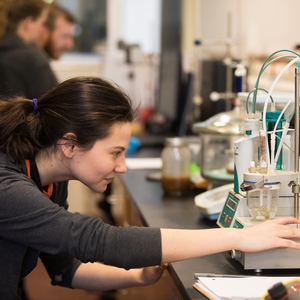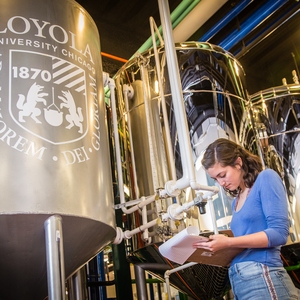Loyola University Chicago Biodiesel Program
Loyola University Chicago
Project Overview
The Biodiesel Program, part of the Searle Center for Sustainability Innovations in Loyola’s Institute of Environmental Sustainability, saw its humble beginnings grow from an ingenious student idea to one that has developed into a dynamic, zero-waste biodiesel production process. This licensed, student-run program is an epicenter for scholars to develop innovative and creative solutions to environmental issues. Specifically aimed at undertaking sustainability issues facing our campus and also the greater Chicago community as a whole, the initial idea proposed taking the used cooking oil waste from campus dining halls and cafes and converting it into biodiesel fuel that would run the shuttle bus system for the University. This simple zero-waste system on a small campus scale has set the groundwork for many programs in the center today that continue to foster and advance student research ideas. In this innovative atmosphere, growth continues through the development of personal care products, anaerobic digestion, and algal cultivation. (See file “Biodiesel Mind Map” below for complete outline of product flow through the program.)
Background
Housed within Loyola’s Institute of Environmental Sustainability, the Searle Center for Sustainability Innovations hosts a number of programs focused on zero-waste processes, green business innovations, and experiential learning opportunities for undergraduate students. The marquee program is a student-run green business that focuses on utilizing waste products to create renewable fuels through an innovative zero-waste process. Students in this program have the opportunity to transform their classroom knowledge into real world skills by challenging them to think holistically as they operate a licensed business, conduct research, and perform community outreach. The Biodiesel Program was founded, expanded, and continues based on the hard work of dedicated undergraduate students seeking a deeper engagement with the systems at play outside of the controlled environment of the University. The projects in the program require students to incorporate scientific, business, social, and practical hands-on skills in order to not only assess, but also implement solutions to pressing environmental issues. Students involved in the program over the years have researched zero-waste biodiesel production that utilizes all of the glycerin created during the process; built a business plan that allows the program to fund itself while serving others; helped hundreds of teachers introduce biodiesel and environmental sustainability into their curriculum; and collaborated with dozens of universities to expand this model across the United States. We aim to demonstrate that a well-planned, conscientious business can thrive in a commodity economy by looking beyond a single product, a single system, or a single outcome and instead strive for magis. The Biodiesel Program is a certified green business with the Illinois Green Business Association (IGBA). We are committed to operating our student-run enterprise in the most environmentally conscious way possible. From the products that we sell and where we source our materials all the way to how we get to work, we balance our triple bottom line: finance, environment, and community. We are the first and only school licensed to sell biodiesel to the general public. This requires that we be licensed by, report to, and meet the continuing standards of the US Environmental Protection Agency, Illinois Environmental Protection Agency, State of Illinois, Cook County, City of Chicago, American Society of Testing and Materials, and the needs of our dedicated customers. We operate the smallest licensed biodiesel production facility in the United States to show that innovative business models work and we can build a sustainable economy while meeting societal demands.
Goals
The goals of the Biodiesel Program are: 1) be student-built, student-operated, and student-led in all aspects of the program; 2) be financially self-sustaining through sales, research grants, and student research fellowships; and 3) focus on production, research, and outreach efforts centered on utilizing waste products to create clean energy and establish a zero-waste process.
Implementation
Starting with a small group of students in a Solutions To Environmental Problems (STEP) course, the Biodiesel Program in the Searle Center for Sustainability Innovations has continuously grown over the past eleven years into a full-scale certified green business. The research, production, quality control chemical analysis, business operations, and new ideas have all come from the dozens of undergraduates that have worked on this program. While the first students were in a class, most of the students involved in the program have been researchers (fellowships and grant funded) and employees (on-campus job paid for with sales revenue). We also have been helped by volunteers, class projects working on specific problems, participants in the First Year Research Experience (FYRE) program, and by numerous mentors throughout the University. Our process starts with collecting used cooking oil from cafeterias and restaurants throughout Chicago. The oil is filtered to remove water and sediment which is collected and sent to anaerobic digesters at water treatment plants in nearby suburbs. The filtered oil is then tested for contaminants before we start the chemical reaction (transesterification) to convert the oil into biodiesel and glycerin, our primary by-product. The glycerin is refined separately from the biodiesel and turned into an environmentally friendly hand soap that is used in dispensers throughout the University. The biodiesel is then further refined by distilling excess methanol (to be recovered and reused in future reactions) and washing with water. The water removes the final contaminants and is the starting point for our wastewater treatment process that utilizes algae to clean the water before being harvested to make fish food. The final biodiesel product is then rigorously tested to ensure it meets industry standards before being sold to the University shuttle bus operator to offset their use of petroleum diesel fuel. Undergraduate education and waste reduction are prioritized in all areas of the Biodiesel Program. Used cooking oil from campus dining halls is converted into biodiesel, a clean-burning fuel that powers campus shuttles and reduces greenhouse gas emissions from transportation. Waste products from the biodiesel production process are then used in a variety of ways, like our glycerin byproduct that is turned into our award-winning soap (EPA Safer Choice Partner of the Year 2015). Nutrient-rich wastewater is used in algal cultivation experiments and other organic wastes are used in anaerobic digestion experiments, both conducted by undergraduate students. Student internship and research fellowship opportunities allow students at the University to learn about and participate in the production of clean energy, the reduction of waste, and additional sustainability endeavors.
Timeline
The Biodiesel Program has been in operation since 2007 and has no plans of slowing down. Below are some of the highlights from the past 11 years. 2007: Loyola University Chicago launches the Solutions To Environmental Problems (STEP) class that developed the Biodiesel Program. 2008: STEP students presented their work and business plan to the Board of Trustees; Received donation from the Searle family to fund the program until sales started; Received EPA P3 Grant to expand high school outreach; Moved out of a classroom and into the first biodiesel lab. 2009: Became fully licensed to sell biodiesel. 2010: Sales of biodiesel start and the fuel is implemented into University shuttle system. 2011: Presented Biodiesel Program at Congressional Briefing (Capitol Hill Innovations). 2012: Awarded EPA grant to research sustainable wastewater treatment in biodiesel production. 2013: Move into the new Searle Biodiesel Lab in the Institute of Environmental Sustainability. 2014: BioSoap production expands and BioSoap is introduced into campus restrooms. 2015: Awarded EPA Safer Choice Partner of the Year Award for incorporating soap production into zero-waste biodiesel production process. 2017: Awarded EPA grant to research anaerobic digestion of organic waste from our campus, including by-products from the Biodiesel Program. 2010-Current: Expansion of oil collection network to include most universities and museums in Chicago (Northwestern University, Shedd Aquarium, Art Institute of Chicago, DePaul University, and more. For full list see link below.)
Financing
The Biodiesel Program has been funded by a mix of revenue from the sale of our products, federal research grants, and private donations.
-
Sales Revenue - $175,000 - Operating as a small business within the University has allowed us to fund our day-to-day operations, including paying our student operations team, with revenue from the sale of biodiesel, BioSoap, testing services, and mobile biodiesel processors for high schools.
-
Federal Research Grants - $205,000 - We have been awarded five Environmental Protection Agency P3 grants (People Prosperity and the Planet). This student-oriented sustainable-design grant program has allowed us to launch the program (2007), take biodiesel production into high schools (2009-2010), design living machine for wastewater treatment (2012), incorporate wastewater treatment in our biodiesel production (2013-2015), and investigate small-scale anaerobic digestion of campus waste (2017). This has also provided us the opportunity to present our work at 6 national conferences, on The Mall in Washington DC, and at a US House of Representatives EPA Briefing.
-
Private Donations - Private donations have helped us during periods of transition and expansion. Specifically as we worked to launch our business plan (2007-2009) that required us to become the first licensed biodiesel operator at a school in the US, and when we moved into our new facility and significantly expanded our operations (2013).
Results
The Biodiesel Program has had a lot of success over the years between our products, research, and the great students that have graduated through this program. The following are just some highlights:
-
Student Intern/Employees: 58
-
Student Researchers: 21
-
Total Students Involved: 158
-
Used Cooking Oil Collected: 65,000 Gallons
-
Biodiesel Produced: 27,000 Gallons
-
BioSoap Produced: 4,500 Gallons
-
Carbon Offset (from biodiesel use): 252 Tons
-
Program Waste Utilization Rate: 64%
-
Research Grants Awarded: 5
-
Student Conference Presentations: 16
As these numbers show, through the Biodiesel Program extensive amounts of waste products have been repurposed and put to use as fuel, soap, and more. Greenhouse gas emissions from traditional petroleum diesel have been reduced, and because of this the overall footprint of the University has also been reduced. Many students have been engaged in clean energy production, waste reduction, and research through the Biodiesel Program, providing them with valuable, empowering experiences. Undergraduates who are involved in this program have gone on to successfully pursue careers related to sustainability. Many high school students have also been exposed to clean energy innovations and environmental science at a young age as a result of this program.
Lessons Learned
The main lessons we have learned are that waste is only waste if we let it be wasted, and there is no problem that undergraduates can not solve if given the resources to succeed. We have found so many different ways to use “waste” from the biodiesel process over the years (patio torch fuel, lip balm, windshield wiper fluid). While those products may not be our best solution (and have since been discontinued), they show that a well designed system (business, university, city) can sustain a circular economy and stop the harmful generation of excess waste. We learned this while working through innumerable problems as a team of undergraduates. We learned that we did not need to have the right answer all of the time, just the right question and enough support to get us started toward a solution.


